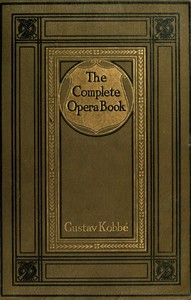The Complete Opera Book by Gustav Kobbé
"The Complete Opera Book" by Gustav Kobbé is a comprehensive reference work on opera written in the early 20th century. This publication serves as a detailed guide to the stories of operas, presenting analyses alongside musical notation of over 400 significant arias and motives. It touches upon the evolution of opera across different schools, particularly Italian, French, and German, while also highlighting key composers and their works. The opening of the book
introduces readers to the essential schools of opera, explaining the distinctive characteristics of each: the melodic focus of Italian opera, the rich orchestration of French compositions, and the dramatic depth found in German operas. Furthermore, it discusses the evolution leading to Gluck’s reforms, which aimed to restore balance between vocal and instrumental elements in opera, emphasizing the importance of dramatic expression over mere vocal display. Gluck's "Orfeo ed Euridice" is noted as a pivotal work that marked the transition to a more dramatic and expressive form of opera. Overall, this introductory segment effectively sets the stage for a deep exploration of operatic history and analysis. (This is an automatically generated summary.)
Read now or download (free!)
| Choose how to read this book | Url | Size | ||||
|---|---|---|---|---|---|---|
| Read online (web) | https://www.gutenberg.org/ebooks/40540.html.images | 2.1 MB | ||||
| EPUB3 (E-readers incl. Send-to-Kindle) | https://www.gutenberg.org/ebooks/40540.epub3.images | 22.0 MB | ||||
| EPUB (older E-readers) | https://www.gutenberg.org/ebooks/40540.epub.images | 18.5 MB | ||||
| EPUB (no images, older E-readers) | https://www.gutenberg.org/ebooks/40540.epub.noimages | 825 kB | ||||
| Kindle | https://www.gutenberg.org/ebooks/40540.kf8.images | 13.6 MB | ||||
| older Kindles | https://www.gutenberg.org/ebooks/40540.kindle.images | 13.3 MB | ||||
| Plain Text UTF-8 | https://www.gutenberg.org/ebooks/40540.txt.utf-8 | 1.6 MB | ||||
| Download HTML (zip) | https://www.gutenberg.org/cache/epub/40540/pg40540-h.zip | 22.1 MB | ||||
| There may be more files related to this item. | ||||||
About this eBook
| Author | Kobbé, Gustav, 1857-1918 |
|---|---|
| Title |
The Complete Opera Book The Stories of the Operas, together with 400 of the Leading Airs and Motives in Musical Notation |
| Note | Wikipedia page about this book: https://en.wikipedia.org/wiki/The_Complete_Opera_Book |
| Note | Reading ease score: 70.1 (7th grade). Fairly easy to read. |
| Credits |
Produced by Charlene Taylor, Linda Cantoni, and the Online Distributed Proofreading Team at http://www.pgdp.net (This file was produced from images generously made available by The Internet Archive/American Libraries.) |
| Language | English |
| LoC Class | MT: Music: Musical instruction and study, Composition |
| Subject | Operas -- Stories, plots, etc. |
| Category | Text |
| EBook-No. | 40540 |
| Release Date | Aug 19, 2012 |
| Most Recently Updated | Oct 23, 2024 |
| Copyright Status | Public domain in the USA. |
| Downloads | 519 downloads in the last 30 days. |
| Project Gutenberg eBooks are always free! | |

